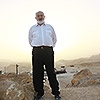 Question: Surveys show that 80 percent of humanity believes in the higher power that controls everything. Why don’t we explain to people what kind of power it is and what it wants? It is much more interesting than the calls for love.
Question: Surveys show that 80 percent of humanity believes in the higher power that controls everything. Why don’t we explain to people what kind of power it is and what it wants? It is much more interesting than the calls for love.
Answer: We have nothing to explain. The upper force is Nature, the law, the force as unyielding as the force of gravity. It is Absolute who is Good, does Good, and does not change.
If this force is invariable, it is as if nonexistent. The absence of change seems to cancel it. It is like living under the sun, forever stuck at the zenith. There is no point of taking it into account if it is and will be there always. It just is, and that is all.
In our life, we make calculations based on what has to change, on advancements we depend on. It is another matter if we talk about something permanent and indestructible on which we depend constantly to such an extent that it cannot be called dependence.
This is what the “Creator” is. And that is why it is so difficult to explain this to people. In reality, we pray not to Him but to ourselves. We seek how to change, and He is always unchangeable. Of course, I will change if I desire it, and to do this, I do not need to take Him into account. He is Good and does Good, and next to Him, I am like a spoiled child whose parents give him absolute love, while he does whatever pleases him and gets out of control, knowing that nothing bad will happen to him.
Thus, our problem is how to explain to people that the Creator is like a solid wall and simply exists. You can jump in front of it, wave your arms; this is your business, and the wall still towers over you.
A person can barely imagine that: “Then, whom am I dealing with? It means that there is nobody to ask.” How can we explain to those who believe in the higher power that it does not make sense to pray to the “changeable” Creator who would do better today than yesterday. Does it mean that yesterday He caused me harm?
In reality, we deal with the One who is Good and does Good to the wicked and to the righteous. But for a person, this means that regardless of whether he is good or bad, the result will be the same.
An ordinary person is subject to changes constantly. All the time, he compares himself with the world, trying to calculate the results of internal and external changes. He does not understand what the universal, general, great, immutable Force is. This eludes our sense organs because they are “tuned” to changes rather than to the static condition. I just do not see what does not change, does not disappear from my view.
That is why we cannot explain to people what the “Creator” is. Sometimes, I say that the “Creator” is Nature, that He is unchangeable, and there is no one to pray to, that a prayer is self-judgment. In response, they are ready to tear me to pieces. This is the problem: We judge ourselves, whereas others ask the Creator to change: “I threw a little bit in Your piggy bank, now, save me from troubles.”
Talking of the Creator as of the unyielding law of nature, we deny a person the possibility to turn to Him. A person does not see that he has to change. A new strong “dose” of development is necessary so that a person begins to behave differently.
Whatever we talk about, including the crisis, we essentially explain to people the path of suffering: “Alternatively, it will be troubles, and it is not worth it. Let’s change.” It is not a lie, but not the truth either.
We should tell something else to a person who comes to the wisdom of Kabbalah desiring to reach the goal of creation: “You have to be above this. No matter whether it is good or bad, you have to rise by faith above reason. You should not make your actions conditional on suffering or pleasure. This is not bestowal. Faith above reason means that you rise above the reward. Or do you work to escape evil and achieve good in the future? Are you expecting compensation? Do you want to reach the purpose of creation for yourself instead of giving pleasure to the Creator?”
On the other hand, whom are we supposed to please if the Creator is the law? This is a delicate moment in our explanations.
[46848]
From the Daily Kabbalah Lesson 6/17/2011, “Mesiah’s Horn”
Related Material:
What To Ask From The Creator?
How Can We Tell The World About The Force Of Unity?
Education For The New World
Filed under: Daily Kabbalah Lesson, Inner Work, Kabbalah Dissemination, Prayer and Intention, Q&A, Spirituality - 1 Comment →
 Dear Friends, please ask questions about these passages from the great Kabbalists. The commentaries in brackets are mine.
Dear Friends, please ask questions about these passages from the great Kabbalists. The commentaries in brackets are mine.







